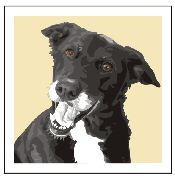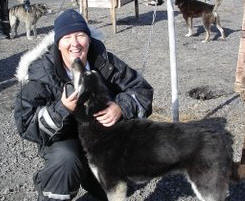Barking up the wrong family tree
 Anyone
who's had a crossbreed or has rescued a dog for agility will have wondered at some point what
breeds made up the mix. Sarah Morris was no different when she rehomed crossbreed Buddy from
Battersea many years ago. Dog behaviour was her passion and so, after a long career in a front line public service,
she decided to
set up her own business testing DNA as knowing about your dogs genetic heritage can help you
understand its behaviour and tailor its training. Here she talks about how to find out more
about your dog's genetic heritage and, more importantly, why you should do it. Anyone
who's had a crossbreed or has rescued a dog for agility will have wondered at some point what
breeds made up the mix. Sarah Morris was no different when she rehomed crossbreed Buddy from
Battersea many years ago. Dog behaviour was her passion and so, after a long career in a front line public service,
she decided to
set up her own business testing DNA as knowing about your dogs genetic heritage can help you
understand its behaviour and tailor its training. Here she talks about how to find out more
about your dog's genetic heritage and, more importantly, why you should do it.
My Buddy was a very
serious boy - assertive and afraid of absolutely nothing with a relaxed calmness. He had a
conformation to die for and had the most graceful extended trot that would grace any doggy
dressage competition! Yet there was something of the Border Collie about him, too, He had that
characteristic stalking movement you see in collies when herding sheep.
So everything fell into place when I did
a DNA test on him and discovered his parentage. Beauceron for his guarding
traits and his fearlessness, Border Collie for his intelligence and agility, and the surprise
of them all... Dalmatian! The clues were there all the time. We just hadn't put two and two
together. Once I knew the results of the test, I was able to tailor a behaviour and
training programme, taking into account what his genes were urging him to do.
As a newly qualified COAPE
dog behaviourist, I was fascinated by what makes dogs tick. The purpose for which a dog was
bred can be the key to finding out how it behaves and the secret to solving behaviour and training
problems. For instance, if your dog has Beagle or Bloodhound heritage, it might explain why you
find recall so hard. Knowing that your dog has Jack Russell or Greyhound in its past, might
make it clear why
it is so difficult to distract it from chasing something or why it is mad about tennis balls.
Armed with this
knowledge of dog behaviour and training, I decided to set up my own company Blackdog-training. It
occurred to me that if you know that your Labrador, for example, was bred to retrieve objects
and bring them back to you, then the best ways of motivating him during training would be
fairly straightforward and apparent. Retrievers retrieve! They do exactly what it says on the tin!
But what if your dog has a
multi-breed heritage? Is he motivated to train if you use a squeaky toy, a smelly sausage, the
promise of a tug game or shaking a furry toy? Blackdog DNA tests can find out exactly what
breeds of dog make up your beloved pooch so you know how to motivate your beloved dog - and in what quantities. So if like Basil here, you
know that your dog's mother was a Border Collie, it can really mean a lot to his training profile
finding out who his father was!
 The
ABC issue The
ABC issue
I recently spent a lovely weekend at Newbury
Showground at the Wallingford DTC agility show. The whole weekend was like a breath of fresh
air for me. As a behaviourist, I spend most of my time dealing with, reading about or studying
dogs with behavioural problems which are usually brought about in some way by humans!
But here were hundreds and
hundreds of happy, happy dogs with owners who want to give their dog a good and meaningful
life. People of all ages were having fun outdoors, running alongside their dogs who were having
an amazing time. Lots and lots of Border Collies were having the time of their lives. This type
of herding dog very often experiences behavioural problems when owners do not take account of
their strong, working drives. The outlet of being able to run around an agility course allows
them to stop, start, watch their owner, jump, change direction, run and satisfy many of their
innate needs.
In fact, Border Collies
are so good at agility that another class of agility has been created to allow other breeds a
look in! If you have a Weimaraner, Great Dane, Dachshund, or mutt you can enter them in
the ABC (Anything But a Collie!) class. Any collies, or collie cross-breeds are not allowed
to enter.
 The
question I am always asked at agility shows is how does one tell if a dog is a really Anything
But a Collie? A first generation Border Collie X Greyhound, for example, might test as
48% Border Collie, 49% Greyhound and then about half a dozen small traces as above. The
question I am always asked at agility shows is how does one tell if a dog is a really Anything
But a Collie? A first generation Border Collie X Greyhound, for example, might test as
48% Border Collie, 49% Greyhound and then about half a dozen small traces as above.
It all boils down to what
the rules for ABC are. If the organisers want a dog to be more than 50% ABC, then they
will not get it. If specific proof of parentage is required, a DNA test will help but it might
be easier to present the results in a slightly different way than by percentage.
The standard result
doesn't give exact percentages of breed results. They come within a range (i.e. Level 2 is
approximately 50%) but the actual result is a lot more complicated. For example, a pure,
purebred pedigree Border Collie will only come back as about 97% Border Collie because DNA
traces go back hundreds - even thousands of years - to the origins of the breed. The
super-accurate result might show 1.03% Chow, .065% Rottweiler and about half a dozen others
etc. It is much easier to express the result as Level 1 (i.e. pure bred) as it takes a bit of
explaining when people are upset that the results don't show as pure as they thought!
DNA
Test Kit
All it takes to ascertain your dog genetic mix is
a painless swab test that you can do at home. The results are back with you
in about three weeks, complete with a personal behaviour and training profile based on the results
of the DNA test. Finding out that Basil here had quite a bit of Husky in his heritage has
enabled his owners to modify his training to focus on particular problem areas. His Border
Collie ancestry has made him a potential agility star!
Taking the time to find
out what breeds make up your mixed breed dog can revolutionise what you know about your dog
rather than what you think you know. It's a once in a lifetime investment that can help you can
tailor your training in such a way that is specific and directed at your dog's strengths and
innate behaviour.
For more information,
visit www.blackdogdna.com
 About
the author... About
the author...
Sarah Morris DipCABT is a qualified COAPE dog behaviourist and has set up her own
business BlackDog DNA. Her interests include mushing huskies, dog
training and anything
doggy.
She was born 20 yards from her family's
allotment. Her parents used
to 'dig for victory' and never got out of the habit. She grew up on an allotment, so
growing veggies is a way of life. She currently lives in Hillingdon (London)
Sarah has blonde hair and blue eyes yet she says that if
she was to have a DNA test it would probably show a trace of black African DNA because of the
way that Northern Europe was colonised after the last Ice Age! Humans from the South moved
North! That is an example of how DNA is traced.
|